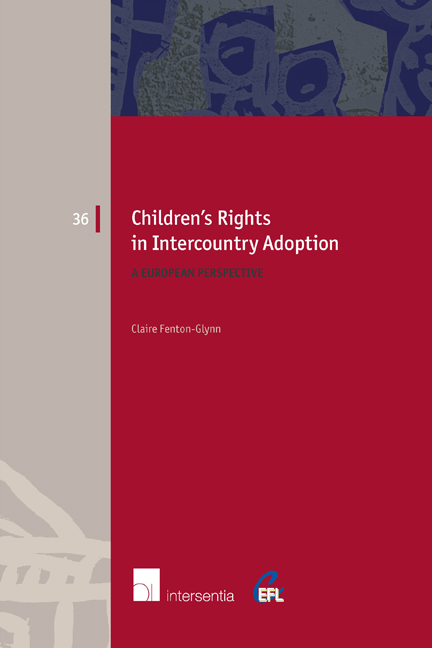Book contents
- Frontmatter
- Dedication
- Acknowledgements
- Contents
- Table of Cases
- Chapter 1 Introduction
- Chapter 2 Combating Abuses: International and Regional Regulation
- Chapter 3 Intercountry Adoption and the Domestic Child Welfare System: The Principle of Subsidiarity
- Chapter 4 Consenting Adults: Giving and Receiving Consent to Adoption
- Chapter 5 Buying Babies: The Inducement of Consent
- Chapter 6 Compulsory Adoption: Adoption Without Consent
- Chapter 7 Child Participation: Autonomy and Protection
- Chapter 8 Adoptive Parents: Eligibility, Preparation, and Support
- Chapter 9 Who Am I? The Child's Right to Identity
- Chapter 10 Conclusion
- List of Legislation
- Literature
- Index
- About the Author
- Miscellaneous Endmatter
Chapter 9 - Who Am I? The Child's Right to Identity
Published online by Cambridge University Press: 26 November 2017
- Frontmatter
- Dedication
- Acknowledgements
- Contents
- Table of Cases
- Chapter 1 Introduction
- Chapter 2 Combating Abuses: International and Regional Regulation
- Chapter 3 Intercountry Adoption and the Domestic Child Welfare System: The Principle of Subsidiarity
- Chapter 4 Consenting Adults: Giving and Receiving Consent to Adoption
- Chapter 5 Buying Babies: The Inducement of Consent
- Chapter 6 Compulsory Adoption: Adoption Without Consent
- Chapter 7 Child Participation: Autonomy and Protection
- Chapter 8 Adoptive Parents: Eligibility, Preparation, and Support
- Chapter 9 Who Am I? The Child's Right to Identity
- Chapter 10 Conclusion
- List of Legislation
- Literature
- Index
- About the Author
- Miscellaneous Endmatter
Summary
The last substantive chapter in this book moves from procedures concerning the adoption process, to a wider issue concerning the welfare of adoptive children in their later life. One of the most prominent debates regarding adoption currently concerns the issue of access to birth records and information concerning an adoptee's origins. This is an issue that arises both in relation to domestic and to intercountry adoption, and raises questions of the balancing of rights between the adopted child and his or her birth parents, adoptive parents, and public policy. However, in many instances, the fact that the child has come from a different country will pose additional burdens that may not be present in a domestic setting, and must also be addressed.
When discussing the child's right to know his or her biological origins, two issues arise: one, whether the information is collected in the first place; and two, whether the child is permitted to access this information. This chapter will thus discuss not only the negative obligation on states not to prevent a child from accessing details regarding his or her parents, but also the positive obligation to ensure that these details are collected and retained.
It is important to note at this stage that the desire of adopted children to access information on their origins can vary dramatically across individuals, and across different periods of their life. Some adoptees might yearn for information, while others have no interest at all. This chapter does not suggest that all people must know their origins, rather that all should be given the opportunity to do so if they so wish.
INTERNATIONAL INSTRUMENTS
UNITED NATIONS CONVENTION ON THE RIGHTS OF THE CHILD
The right of a child to have access to his or her origins was first addressed by the United Nations in the 1986 Declaration on Social and Legal Principles relating to the Protection and Welfare of Children.
- Type
- Chapter
- Information
- Children's Rights in Intercountry AdoptionA European Perspective, pp. 185 - 210Publisher: IntersentiaPrint publication year: 2014



